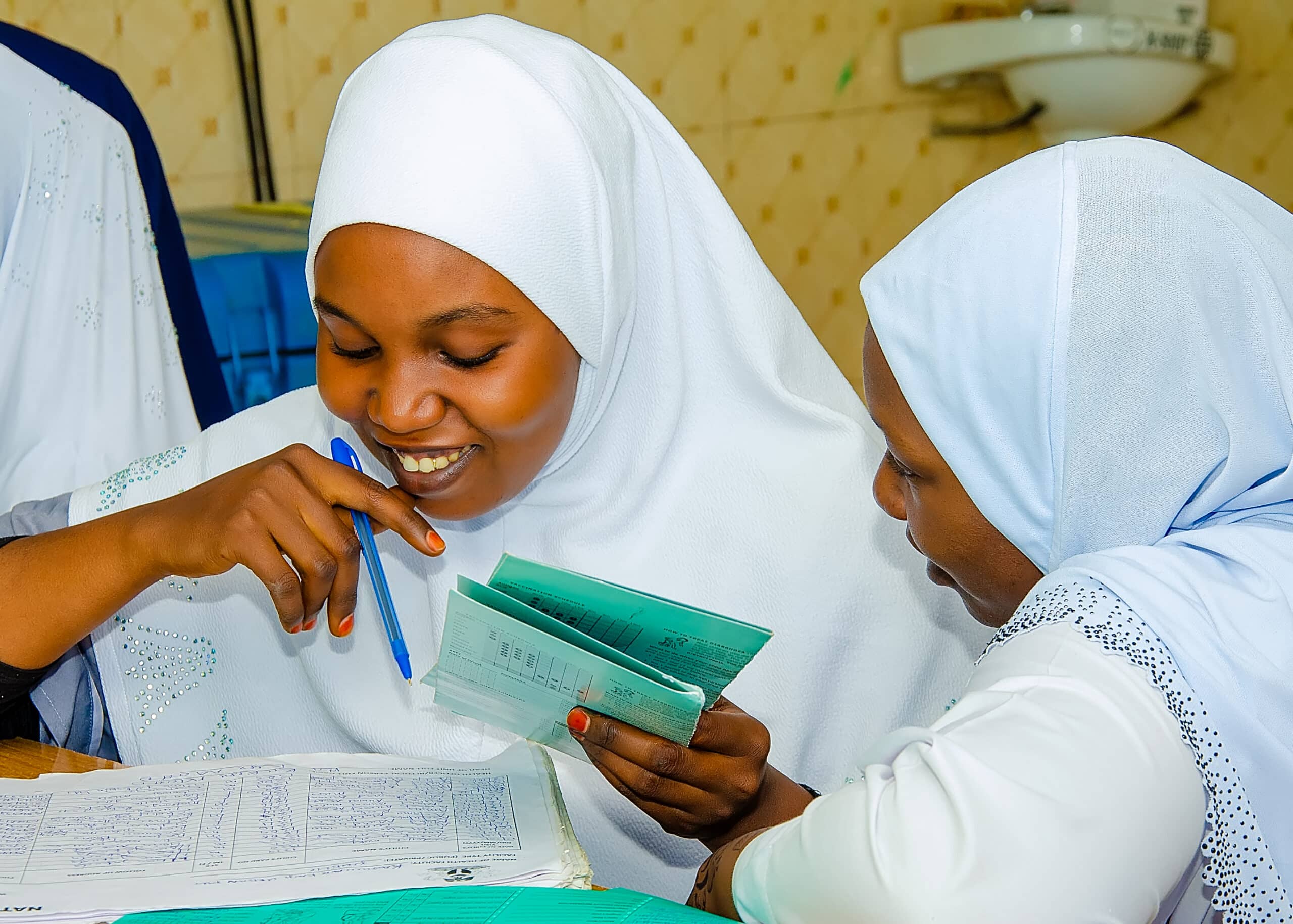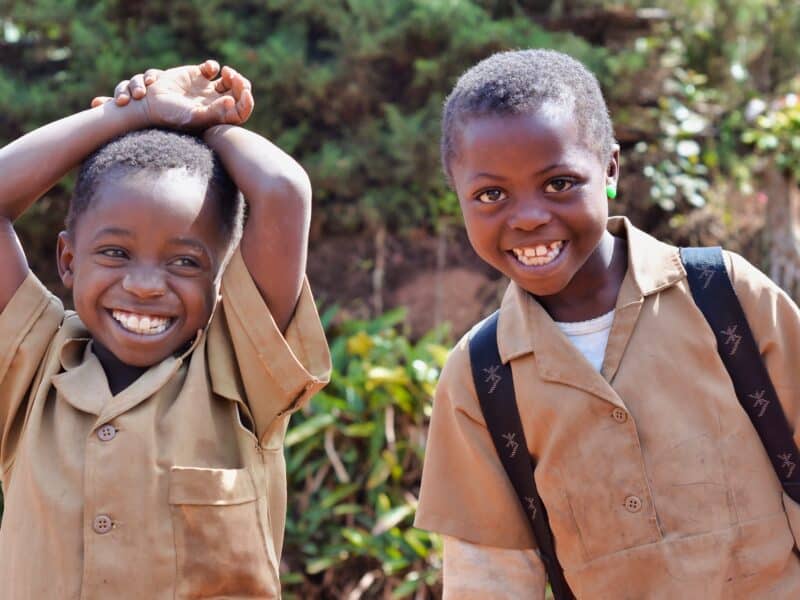For the past seven years, the Johns Hopkins Center for Communication Programs-led Breakthrough ACTION-Nigeria project has worked hand in hand with the government and local communities to improve the health and well-being of millions of people across Nigeria.
Because of the efforts of Breakthrough ACTION-Nigeria and its partners, more pregnant mothers are accessing pre-natal care, more families are sleeping under life-saving mosquito nets, more children with previously undetected tuberculosis are receiving vital treatment, and COVID-19 vaccination rates are up by 75 percent.
To achieve this and more, Breakthrough ACTION-Nigeria implemented both tried and true social and behavior change interventions and developed novel methods. Through its large-scale community health worker intervention, Breakthrough ACTION-Nigeria trained 3,100 community volunteers who engaged more than 16 million community members, made 2.2 million referrals to health facilities, and saw 1.2 million referrals completed. This work accounted for an average of 18 percent of services provided in local health centers.
Working with the community, it created innovative programming such as the Mama Put and the Albishirin Ku! radio programs and, through externally conducted research, discovered that large numbers of Nigerians recalled the messages, with many acting upon them.
Most importantly, by working closely with Nigerians, who were involved in everything from identifying the challenges to developing and implementing the solutions that were part of the project’s activities, it prepared government and community groups to take the successes of Breakthrough ACTION and build on them long into the future.
Those accomplishments are being celebrated on Wednesday in Abuja in a ceremony closing one chapter of a social and behavior change movement, led by CCP, and handing it off to the government and community members who are best suited to ensuring these gains are sustained well into the future.
“What an honor and a privilege it has been to work together all these years,” says CCP’s Shittu Abdu-Aguye, chief of party for Breakthrough ACTION-Nigeria. “Together, we have shifted the needle around many social norms … We’ve also been able to save many lives in the communities where we have intervened.
“We are confident that these activities will continue beyond the lifespan of this flagship social and behavior change project because the capacity now exists in Nigeria to keep the country moving forward.”
At a total investment of more than $100 million dollars over seven years, Breakthrough ACTION-Nigeria was the largest social and behavior country buy-in ever funded by USAID. Activities in many of the 28 countries where Breakthrough ACTION operates will continue until 2025. Breakthrough ACTION-Nigeria’s integrated social and behavior change approach, in which many health areas are addressed at once, was shown to be highly cost-effective as compared to vertical SBC programming, where just one health area is addressed at one time.
From the start, Breakthrough ACTION-Nigeria focused its efforts on increasing the uptake of 17 reproductive health, maternal, newborn and child health, nutrition and malaria priority health practices in five states and focused on six priority malaria control behaviors in seven states. Activities to increase TB testing and case-finding were implemented in seven states, and through its Risk Communication and Community Engagement interventions, the project also supported other states where there were disease outbreaks.
Among countless other findings, Breakthrough ACTION found that women who participated in community activities organized by Breakthrough ACTION-Nigeria were significantly more likely to practice multiple preventive behaviors compared to women who did not participate, including at least four pre-natal visits during pregnancy, delivering in the safety of a health facility, exclusively breastfeeding, consuming a diverse diet and receiving preventive malaria medication at least 3 times during pregnancy.
CCP did not do this work alone. Partners on Breakthrough ACTION-Nigeria include Save the Children US, Viamo, ThinkPlace, ideas42 and the Nigeria Centre for Communication and Social Impact (CCSI). The work has always been carefully aligned with the priorities of the Nigerian government and the Nigerian people, ensuring that the social and behavior change activities contributed to the country’s development concerns.
The stories of people who have been impacted by Breakthrough ACTION-Nigeria are countless, with many describing complete changes of heart after hearing an Albishirin Ku! radio program or talking with their neighbors or colleagues about what they have learned during contact with Breakthrough ACTION’s teachings.
Take Mallam Idrisu Ibrahim, the chief Imam of Sarkin Bwari Central Mosque in the Nigeria’s Federal Capital Territory. As a powerful influencer and religious leader, for years Mallam discouraged his followers from practicing most of the government’s priority health behaviors, most notably immunization. He argued that religious teachings supported his beliefs.
Then he was invited to a community meeting where Breakthrough ACTION facilitated conversations with religious leaders about the role of religious and traditional beliefs on social and gender norms that negatively impact health behaviors. During these sessions, Mallam’s fellow imams rebutted each of his concerns. The group’s leader and fellow religious leaders even spoke to him privately to correct his justifications for opposing health practices.
Over time, Mallam went through a remarkable transformation. Now, he encourages women to access health facilities and services, infuses his religious teachings with useful and accurate health information and changed his family’s own health practices.
“Behavioral change is a gradual process,” he says, “but I am confident that most people are beginning to change and are taking their health seriously now.”
Since 2018, the project built strong partnerships and collaborated with government of Nigeria partners to co-design and co-implement social and behavior change solutions. The project used a “learning by doing approach” as well as traditional trainings, to ensure that practitioners at every level gained knowledge in theory as well as practical and relevant experience, training them to design and implement their own evidence-based and audience-centered social and behavior change work.
“We feel really good about the work we’ve done,” says CCP’s Ian Tweedie, a senior advisor on Breakthrough ACTION-Nigeria. “We feel like we’ve been risk takers. We’ve been innovators. We’ve been great partners. We have really applied evidence-based social and behavior change.
“We also have really centered communities in the both design and the solution making, using human-centered design. We’ve not come in and said this is what works. Instead, we have really worked hand in hand with communities. And because of that, it’s not just about what we’ve achieved, but how we did it that we’re very proud of.”





